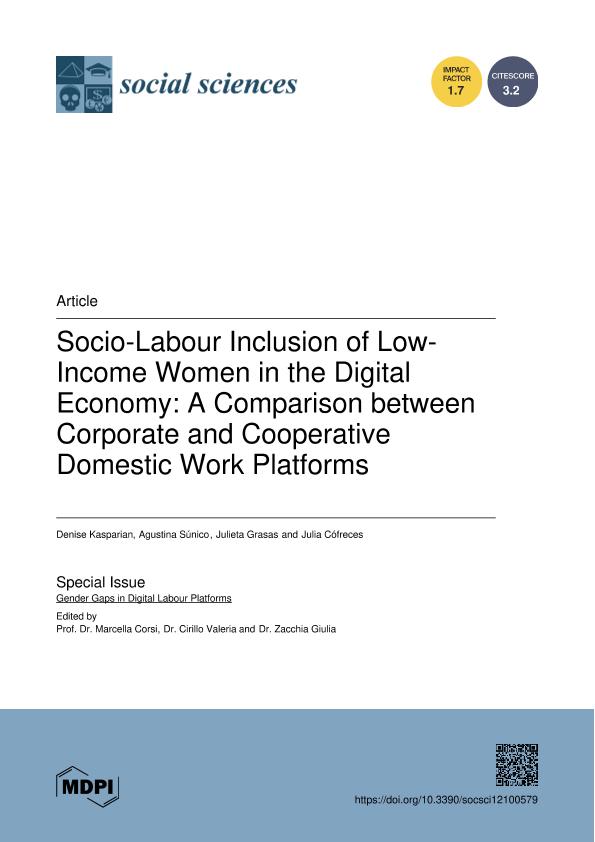Artículo
Socio-Labour Inclusion of Low-Income Women in the Digital Economy: A Comparison between Corporate and Cooperative Domestic Work Platforms
Fecha de publicación:
10/2023
Editorial:
Multidisciplinary Digital Publishing Institute
Revista:
Social Sciences
e-ISSN:
2076-0760
Idioma:
Inglés
Tipo de recurso:
Artículo publicado
Clasificación temática:
Resumen
It is often argued that digital labour platforms entail an expansion of opportunities for women for several reasons. They facilitate the balance between paid work and household chores as a result of time flexibility, they eliminate entry and permanence barriers for typically male work sectors, they enable economic independence, and they favour the creation of professional networks. Several studies, however, have shown that the wage gap, the sexual division of labour, occupational segregation, and gender stereotypes still persist. Hence, to what extent do the new forms of labour mediated by digital platforms lead to an expansion of opportunities for women? This article analyses the socio-labour inclusion of low-income women in digital labour platforms by contrasting the model of corporate platforms against the emerging alternative of platform cooperatives. The movement of platform cooperativism advocates for the creation of platform companies based on democratic ownership and governance models that reduce inequalities in a broad sense. The methodological approach is based on the comparison of two platforms: Zolvers, which was founded in 2013 with headquarters in Argentina and which operates as an intermediary or marketplace between those who offer and those who require home cleaning services, and Up & Go, which was founded in 2017 in New York and is owned by six worker cooperatives that use the platform to offer various services on demand, particularly home cleaning services. Whereas Zolvers offers job opportunities with possibilities of formalisation but no guarantee of stability, Up & Go is owned and managed by worker cooperatives that seek to guarantee living wages for their worker-members. Concerning working conditions, Zolvers reproduces power asymmetries of domestic work, subordinating workers to the platform and the hirers. On the contrary, Up & Go empowers women workers to decide on their schedules and hirers, among other issues. Finally, whereas Zolvers does not enable the participation of workers either in governance or in technology design, the cooperative nature of Up & Go promotes their involvement.
Archivos asociados
Licencia
Identificadores
Colecciones
Articulos(SEDE CENTRAL)
Articulos de SEDE CENTRAL
Articulos de SEDE CENTRAL
Citación
Kasparian, Denise Romina; Súnico, Agustina Abril; Grasas, Maria Julieta; Cofreces, Julia; Socio-Labour Inclusion of Low-Income Women in the Digital Economy: A Comparison between Corporate and Cooperative Domestic Work Platforms; Multidisciplinary Digital Publishing Institute; Social Sciences; 12; 10; 10-2023; 1-19
Compartir
Altmétricas




